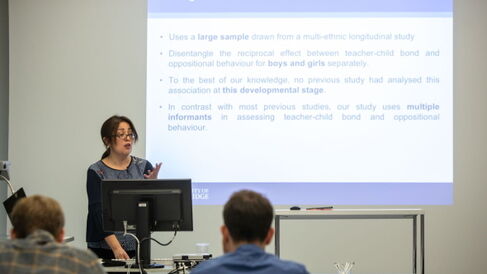
The VRC carries out interdisciplinary research on the causes, prevention and consequences of interpersonal violence in national and international societies. In the second of a series of profiles of VRC researchers, we introduce our Research Associate Dr Sara Valdebenito, who has been working on the Evidence of Better Life Study (EBLS) and also investigating school exclusion, adult reoffending and victimisation of children.
Which are the three questions that drive your work?
- How can we prevent antisocial behaviour in school settings?
- How can algorithms help to design interventions to reduce reoffending and violent crimes?
- What contextual factors need to be taken into account when implementing interventions to prevent violence in different cultural contexts?
Which three keywords summarise your research?
- Meta-analysis and evidence-based prevention of violence
- Machine Learning for crime prevention
- Cross-cultural variations in the patterns of exposure to violence
What is the current focus of your studies?
My current research explores the use of big data, algorithmic analytics and machine learning in criminal justice settings. it aims to test advantages and to understand limitations of algorithms in the forecasting of risk of reoffending among adult probationers.
Dr Valdebenito’s project pages
Evidence for Better Lives
School exclusion
- https://www.vrc.crim.cam.ac.uk/vrcresearch/LEIP
- https://www.vrc.crim.cam.ac.uk/vrcresearch/school-exclusion
- https://crimesolutions.ojp.gov/ratedpractices/102
Victimisation of children in residential units in Chile (Spanish language)
If you missed our previous article, introducing Dr Maria Ttofi’s research, you can read it here.
